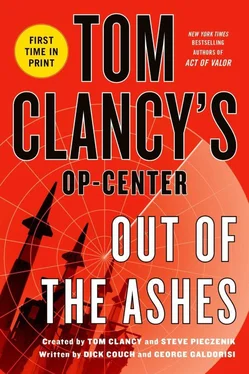“Mr. Kashif?” the man with the green scrubs asked softly. He had coal black hair, soft brown eyes, the smooth olive skin and broad handsome features that marked him as of the upper caste. It was 0430, and in his state Kashif saw only the physician.
“Yes, yes, Doctor?”
“Sir, your wife will be wheeled into ICU recovery in a bit, but it may be some time before you can see her. Does she have an advanced directive?”
“Advanced directive?”
“Yes, an advanced directive. Sir, your wife has severe internal injuries and major head trauma. We’ve already removed her spleen and she has at least four broken ribs. I’m sorry, sir, but you must be prepared for the worst.”
Abdul-Muqtadir Kashif just gasped, but what would follow would be worse.
“Sir, would you sit down, please?” the doctor asked, gently taking Kashif’s arm and helping him into a chair.
“Mr. Kashif, I’m sorry to say your wife has suffered major head trauma and is in a deep coma. We have taken an initial MRI and based on those results we’ve woken up our chief neurologist and he’ll be arriving in less than an hour. We’ll know more then, but I can’t tell you with certainty your wife will ever wake up. That’s why I asked you if she had an advanced directive — in the event her injuries are irreversible.”
“I want to see her.”
“Sir, you can’t see her. She wouldn’t know you were there anyway, and she’s surrounded by doctors, nurses, and life-support equipment.”
“Please, I want to see her,” Kashif implored.
Something in his pleading eyes moved the doctor. “Only through the ICU glass, all right?”
“Yes.”
Kashif hardly even remembered the doctor steadying him as if he were a tottering old man as they walked the short distance to the ICU room that contained his once-vibrant wife.
His eyes went wide with horror at the sight of Jumana. He broke free from the doctor and ran back the way he had come, weeping bitterly. The doctor followed closely behind.
Kashif collapsed in a chair in the waiting room, still sobbing openly, as the doctor sat down with him, putting his steady hand on his shoulder. “Sir, is there someone we can call for you?”
“No.”
“Are you staying nearby?”
“Yes.”
“Sir, can I get you something; a sedative perhaps?”
“No. No. I just need to make some calls. You’ve been very kind. I will be all right here.”
Reluctantly, the doctor had left Kashif alone in the waiting area. An hour had passed and Kashif had sat doing nothing but thinking. He knew he should call his oldest daughter, now sixteen, back in Kuwait City, tell her what had happened, and have her break the news to her two younger sisters. Yet what news? That their mother might be a vegetable for the rest of her life? He couldn’t find the right words, so that call would have to wait.
Kashif felt the bile building and his rage simmering. He had led a good and righteous life and followed the teachings of the Prophet — to a point. What had just happened to them would not stand. Their life had been so blessed. Now it was all but ended and ended by drunken Americans angered by nothing more than the fact their sports team had lost. This was worse than Europe and their stupid soccer! They needed to pay and they needed to pay as dearly as he was now paying.
Most Americans shared the misconception that all Arabs who had wealth were distant cousins of some Middle East monarch, but Abdul Kashif was more than just another wealthy Arab, though few who knew him thought of him as anything more. He was too quiet, too reserved, and not showy as were most Arabs who had money. Kashif had taken his family’s modest funds, his degree in finance from the London School of Economics, a work ethic that would have won approval from Warren Buffett, and the underworld connections of an unsavory uncle from his wife’s side of the family, and had amassed a considerable fortune. It now amounted to several hundred million dollars. He was wealthy and now, for the first time in his life, he was consumed with rage — rage and the desire for revenge.
Some Arabs with the financial resources of Abdul-Muqtadir Kashif contributed to radical Arab causes. Those who did secreted these funds to Arab charities from which a good portion of the money found its way into the offshore accounts of those who ran the charities. Those monies that did find their way to a serious terrorist organization like al Qaeda in the Arabian Peninsula were used by Arabs aligned with AQAP to kill other Arabs. Kashif had no intention of spending his hard-earned money that way.
While he was consumed by rage and the need for revenge, he was not blinded by it. If America was to be punished for what had just happened to him and his beloved Jumana, then it needed to be done professionally and with some precision. A strike like the one Osama bin Laden and Mohammad Atta had brought about on 9/11 was no longer possible. The Americans were too well prepared to allow a repeat of that event. However, there had to be a way, Kashif thought. He was a businessman, and there was always a way.
He picked up his cell phone and called a particularly capable and discreet Lebanese who sometimes worked for his wife’s uncle and arranged for him to fly to New York. With that single call, he had set in motion the events that would once again bring America to its knees.
Aboard Eva Air Flight BR0017
(November 9, 1330 Eastern Standard Time)
Azka Perkasa sat in the midlevel comfort of his business-class accommodations. When the flight attendant came by with the drink cart, he asked for tea. The attendant was polite and demure, and he lowered his head in thanks for her kind attention and service. He had left Washington’s Dulles Airport early Sunday morning on a direct flight to San Francisco. Now he was flying on an Eva Air 747–400 that would take him from San Francisco to Taipei and then on to Kuala Lumpur. He was glad to be on a Taiwanese carrier and even more glad to be out of American airspace. He almost always flew coach class, as his current occupation dictated that he keep a low profile, but after what he had just accomplished, he felt that just this once he could allow himself a small pleasure.
Perkasa was Indonesian by birth, Chinese by ethnicity, and Christian in his upbringing and education. His paternal grandfather had left Hong Kong under a cloud of shame his parents refused to talk about. They settled first in Jakarta, but following yet another business reversal, moved to the West Java city of Bandung. His family was poor to the point of despair, and Perkasa and his three sisters had grown up with barely enough to eat. Being both poor and Chinese caused his family to be shunned by both the small but affluent Chinese minority and the Javanese majority.
At the mission school, he proved to be an exceedingly bright student. He studied hard, kept to himself, and vowed that he would someday not be poor and hungry. When a typhoon destroyed their home, he left without a word and headed back to Jakarta. There he found work as a janitor for an American firm of consulting engineers who designed the skyscrapers that seemed to be springing up everywhere in the capital city. There he was noticed, trained as a clerk, then as a draftsman. Finally, one of the senior engineers said, “This Azka is a bright lad. Let’s get him to the polytechnic. Might even put us in a good light with the locals come contract time.”
He again excelled in school, but he would always be one of them, a token local; he would never be a partner and never see the inside of the boardroom. He wanted more, much more. One day, seemingly out of the blue, a rival firm just down the street from his approached him with an offer of cash for information about a bid his firm was about to submit on another high rise; specifically, the amount of the bribe his firm had offered to the building authority. He gave them the information without hesitation and pocketed the money.
Читать дальше












